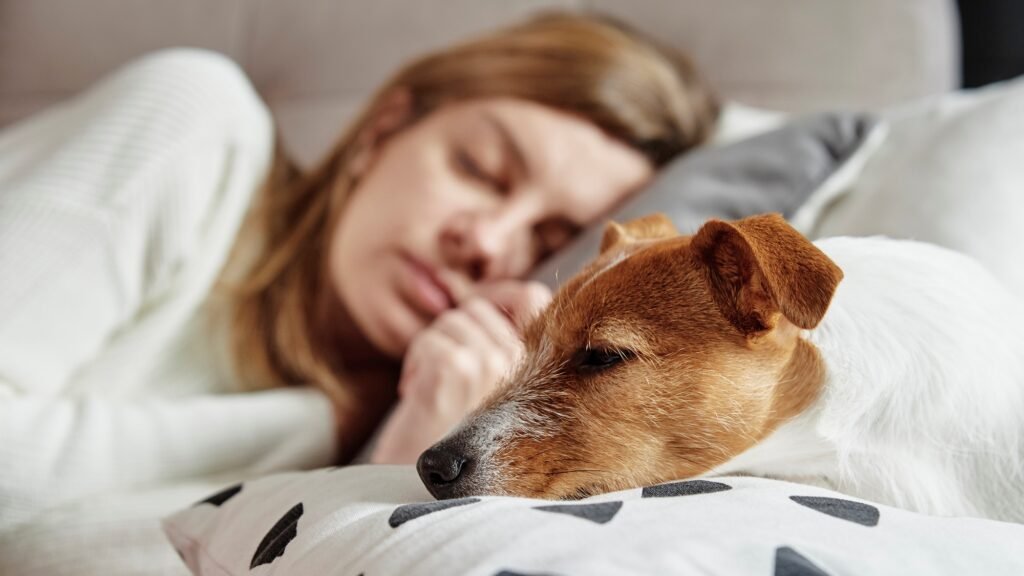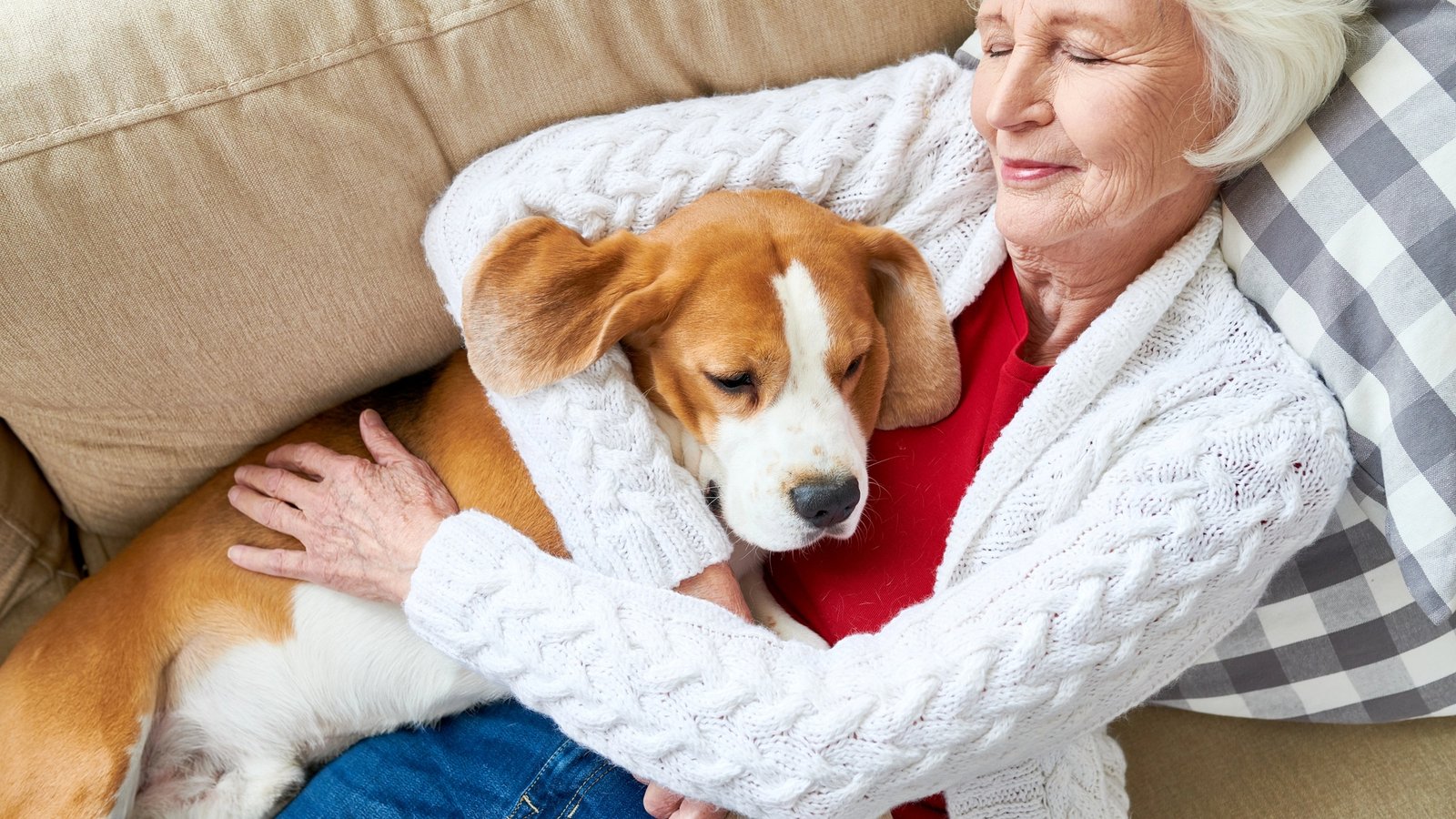Have you ever tossed and turned at night, wishing for a magical solution to those restless hours? The answer might just be curled up at the foot of your bed—your furry best friend. Beyond the companionship and unconditional love dogs bring, they can also have a surprising impact on your sleep quality. From reducing stress and loneliness to creating a sense of security, dogs have an uncanny ability to help us drift into a more peaceful slumber. Let’s explore how sharing your nights with a dog can lead to sweeter dreams.
The Science of Sleep

To understand how dogs can improve sleep quality, it’s essential first to comprehend the science of sleep itself. Sleep consists of 4 stages, including Wakefulness to sleep (N1), light sleep (N2), deep sleep (N3), and rapid eye movement (REM) sleep. A healthy night of sleep involves at least three to four cycles of sleep each lasting approximately 90 to 20minutes. Each stage plays a critical role in maintaining overall health, from rejuvenating the body to consolidating memories. Additionally, sleep also depends on your circadian rhythm, a healthy sleep-wake routine that promotes restful sleep.
Comparison Between Human and Dog Sleep

While a sleep cycle is generally similar between Dogs and humans, there are differences in the way both sleep largely due to differences in how they rest. Humans are monophasic sleepers, typically consolidating their sleep into one long stretch at night, while dogs are polyphasic sleepers, meaning they nap multiple times throughout a 24-hour period. Dogs enter and exit REM sleep much faster than humans, allowing them to achieve restorative rest in short bursts. This polyphasic pattern means dogs are naturally more adaptable to changes in routine but also more likely to wake frequently, reflecting their evolutionary role as vigilant companions.
The Therapeutic Value of Touch

Physical touch is known to release oxytocin, a hormone associated with bonding and stress reduction. This “feel-good” hormone helps decrease cortisol levels, a stress hormone, therefore creating a calming effect that can improve sleep quality. Snuggling with a dog naturally taps into this therapeutic value of touch, promoting relaxation.
Emotional Support and Stress Reduction

Owning a dog has numerous mental health benefits, including decreased feelings of loneliness and depression. These improvements can translate into better sleep patterns, as a more positive mindset can mitigate disorders like insomnia that often accompany poor mental health. Dogs provide emotional support that can significantly reduce stress and anxiety levels. Many people find comfort in their presence, which can ease worries and create a more peaceful mind before bed. As high stress is a known disruptor of sleep, reducing it through the companionship of a dog can aid in achieving better sleep.
Comfort and Security

The body naturally seeks warmth and comfort during sleep, a condition that dogs can easily provide. Their body heat can help regulate your temperature under the covers, making it easier to fall asleep and stay asleep. This warmth and comfort can be especially beneficial during colder seasons. Moreover, Having a dog nearby often creates a sense of security. This can be attributed to their innate protective instincts, often leading owners to feel safer and more secure in their homes. This heightened sense of security can relieve anxiety, enabling easier transitions into the deeper stages of restful sleep.
Consistency and Routine

Dogs thrive on routine, and this can positively impact your sleep schedule. A consistent bedtime routine helps signal the body to wind down. Having a dog can encourage this routine, as their own sleep and bathroom habits typically require regular and timely attention.
Considerations for Co-sleeping

While many benefits exist, it’s important to consider that sleeping with a dog is not for everyone. Some individuals might experience allergies or find their sleep interrupted by a dog’s movements. It’s crucial to evaluate your personal needs and any potential downsides in relation to co-sleeping with a pet.
Creating an Optimal Sleep Environment

To maximize the benefits of sleeping with a dog, it’s essential to maintain an optimal sleep environment. This includes keeping your bedroom clean, ensuring your dog is groomed and pest-free, and establishing clear boundaries if necessary. Creating a cozy and comfortable space for both you and your canine can lead to improved rest and well-being. Snuggling with a dog can indeed enhance sleep quality for many individuals, thanks to their ability to provide warmth, comfort, and emotional support. While there are considerations to keep in mind, the potential benefits to mental health, stress reduction, and overall sleep consistency highlight the value of canine companionship in a good night’s sleep. Whether you already share your bed with a dog or are contemplating it, understanding these factors can help make informed decisions for both you and your furry friend.

Andrew Alpin from India is the Brand Manager of Doggo digest. Andrew is an experienced content specialist and social media manager with a passion for writing. His forte includes health and wellness, Travel, Animals, and Nature. A nature nomad, Andrew is obsessed with mountains and loves high-altitude trekking. He has been on several Himalayan treks in India including the Everest Base Camp in Nepal.






